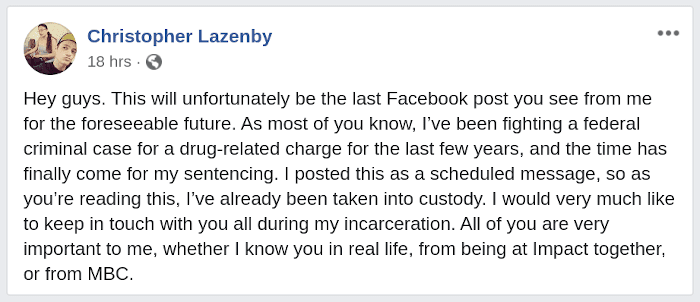LA Man Wrote Prescriptions, Resold them on the Darkweb
A Riverside County man was sentenced to 120 months in prison for stealing the identities of at least nine doctors, using their identities to write prescriptions for himself, filling the prescriptions, and then selling the pharmaceuticals on the darkweb.
Christopher Lazenby, 29, of Riverside County, California, stole the identities of at least nine doctors as well as one physician’s assistant as a part of a drug trafficking scheme, according to an announcement from the United States Attorney’s Office. He the identities of doctors because he needed their DEA numbers. Using the stolen identities, Lazenby accessed the DEA’s online registration system and changed the doctor’s addresses to the addresses of mailboxes he had rented in South Los Angeles as well as in Carson. He changed the address of one doctor’s medical office to the address of a room at a Motel 6 in Inglewood.

Christopher Lazenby
Lazenby had prescription pads with the names and DEA numbers of legitimate doctors. He also had fake IDs for at least six identities. Using the prescription pads, Lazenby wrote prescriptions for fake or stolen identities under his control. He forged the doctor’s signature on the prescription and had them filled by pharmacies, both online and in person.
The DEA’s investigation began after they learned about a number of fraudulent address changes for doctors in and around Los Angeles. The case was simple. Investigators checked out the recently changed addresses for doctors in the area and learned that someone matching Lazenby’s description had rented mailboxes at a number of UPS stores. He had used fake driver’s licenses and fake names to rent the mailboxes but the DEA still had enough information to identify Lazenby from the ID photos. Additionally, Lazenby had registered as the customer in his rental application at one of the UPS stores where he had also used a photo ID with his real name and picture.
During the DEA’s investigation into the mailboxes, the UPS store employees notified the DEA about packages addressed to Lazenby’s rentals. In nearly every instance recorded by the DEA and listed in court documents, Express Scripts had shipped the packages to a patient C/O Lazenby. Lazenby also controlled the identity of the patient on the address label.
After receiving packages, Lazenby resold the prescriptions on the darkweb as well as on Craigslist, according to the United States Attorney’s Office for the Central District of California. Many of the court documents filed after the original criminal complaint were filed under seal and are therefore unavailable to public, limiting the amount of information about the distribution aspect of Lazenby’s operation.
DEA Special Agent Erwin M. Benedicto:
Staff at the UPS Store showed me the three parcels. There was an approximately two inch rip in the side of the FedEx parcel, through which I was able to observe that the FedEx parcel contains three pharmacy pill bottles; labeling on one bottle showed that it contained hydrocodone […], labeling on a second bottle showed that it contained Adderall […], and I was not able to read the label on the third bottle.
And later, after obtaining a search warrant for the packages, the Special Agent listed the contents of the packages:
a. The FedEx parcel contained:
(i) one bottle of hydrocodone/acetaminophen Tab 10/325, 28 tablets;
(ii) one bottle Vyvanse Caps 70 mg, 180 tablets; and
(iii) one bottle amphetamine mix 30 mg, 180 tablets.
b. The UPS parcel contained:
(i) one bottle alprazolam 1 mg
c. The USPS parcel contained:
(i) one bottle hydromorphone HCL 8 mg; and
(ii) one bottle amphetamine mix 20 mg, 180 tablets.
The DEA learned that Lazenby had been staying at a Residence Inn by Marriot in Torrance during the investigation. In October 2018, investigators spoke with the hotel manager about Lazenby. The manager informed investigators that Lazenby “has recently been receiving shipments of parcels to the hotel, and that [Lazenby] has been dropping off parcels with the hotel front desk for outbound shipment.” Investigators viewed electronic logs confirming the manager’s statements.
Law enforcement arrested Lazenby in November 2018.
During searches of his hotel room and car, law enforcement seized narcotics, including 196 grams of methamphetamine, oxycodone pills, prescription pads in the names of the identity theft victims, and rubber stamps in the names of the victim doctors.
In September 2019, Lazenby pleaded guilty to two counts of possession with intent to distribute methamphetamine and oxycodone. On March 9, 2020, United States District Judge Stephen V. Wilson sentenced Lazenby to 120 months in federal prison. Other sentencing information has not yet been unsealed.
